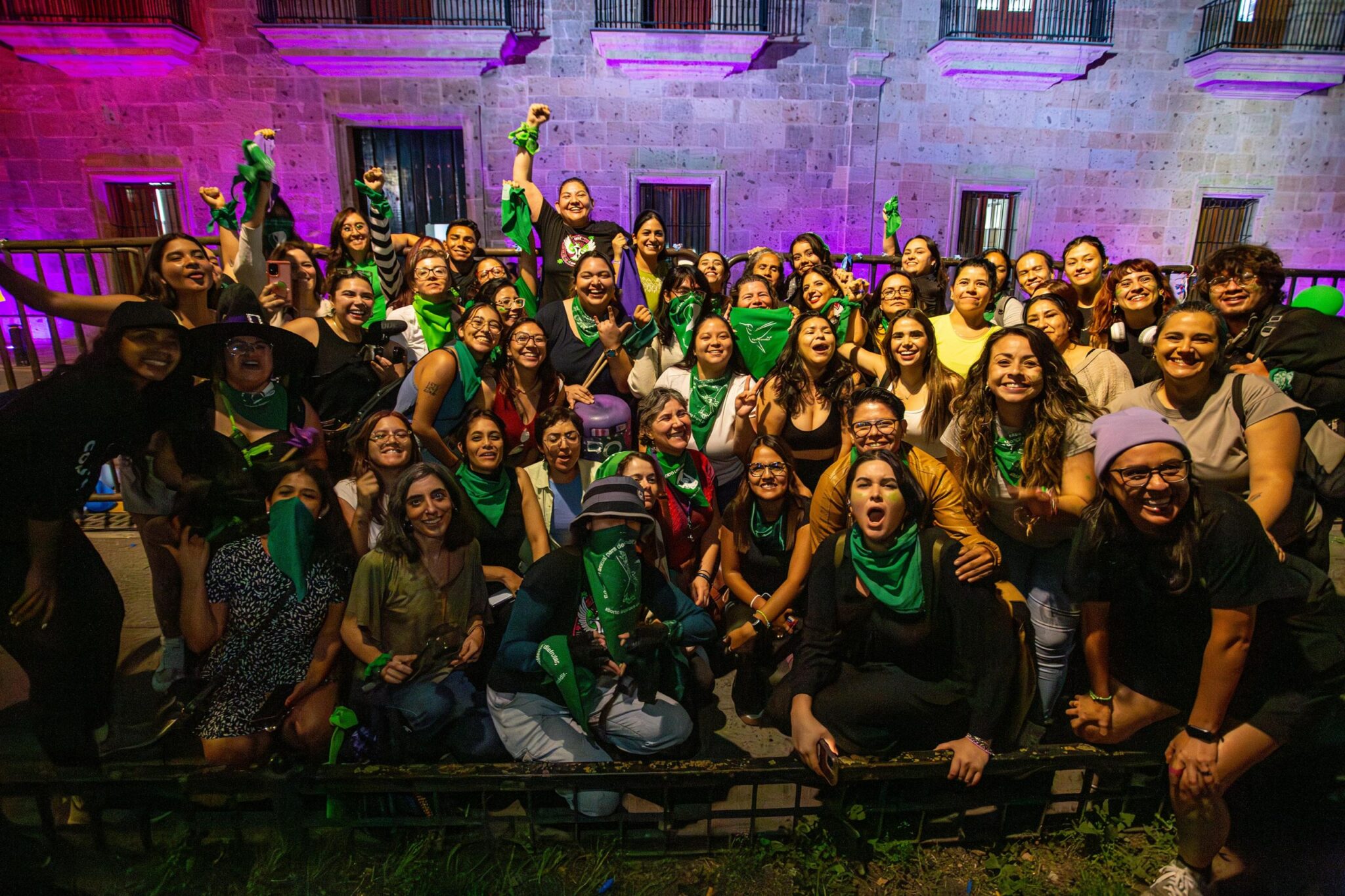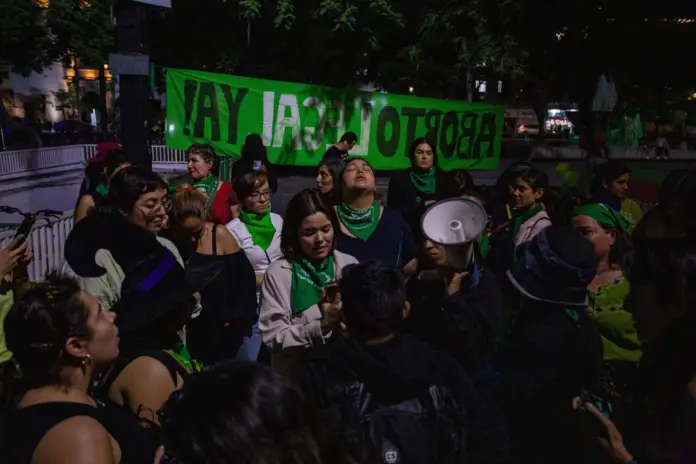
Collectives, women, and people with the ability to bear children celebrated the triumph of the historic struggle for the decriminalization of abortion in Jalisco this Friday, October 4.
The day began after 12:30 p.m., after the start of the 215th Extraordinary Session of the Congress of Jalisco and the installation of a Temporary Special Commission, in which the review and discussion in the plenary session of the Decree Opinion that contemplates the resolutions of the Indirect Amparo 344/2023 of the Second Collegiate Court in Criminal Matters of the Third Circuit was approved.
This resolution determines as unconstitutional the articles that prohibit voluntary or self-procured abortion within the Penal Code of Jalisco and orders the Congress of Jalisco to repeal this crime from local legislation; it also urges the Ministry of Health to guarantee abortion services in public institutions. The Network for Sexual and Reproductive Rights of Jalisco (Ddeser Jalisco) together with allied collectives and networks recently gave an ultimatum to the Congress of Jalisco, who until this Friday had remained silent in complying with the provisions of the Supreme Court of Justice of the Nation (SCJN), as well as the Second Collegiate Court in Criminal Matters of the Third Circuit.
Its deadline was October 31, however, 28 days before the end of the functions of the LXIII Legislature, the deputies said yes to the decriminalization of abortion in the state.
After more than 10 hours of waiting, the first preliminary vote resulted in 18 votes in favor, 18 against and one abstention, however, in a second round, the final decision ended with a majority of 20 votes in favor. In both cases through voting via ballot or “secret ballot.”
According to the provisions of article 181 of the Organic Law of the Congress of Jalisco, after a tie vote, the plenary can cast its vote again at least once to try to reach a decision.
In Jalisco, abortion was already legal under four non-punishable causes: when the pregnancy is the result of rape, if the woman is in danger of death or serious damage to her health, or if she suffers an imprudent abortion. The approved ruling decriminalizes voluntary or self-procured abortion up to 12 weeks of pregnancy for women and people with the capacity to bear children, however, it is important to note that it continues to consider abortion a crime.
For the collectives and networks for sexual and reproductive rights in the entity there is still work to be done, so they have called on the LVXIV Legislature to assume and address the debts that remained pending after this determination. Among them, removing abortion completely from the Penal Code, reforming other complementary laws that make the execution of this decision viable, such as the comprehensive care of voluntary abortion services and other sexual and reproductive rights for women and people with capacity in the state, in addition to the allocation of a budget.
What does the voted opinion say?
The voted opinion repeals section XVI of article 27 and article 227; reforms articles 228 and 229; and adds articles 228 Bis and 228 Ter of the Penal Code of Jalisco.
In this way, article 228 decriminalizes voluntary abortion in women and people with the capacity to gestate up to the 12th week of gestation, as well as for those people who “consent to another person performing it.” However, it considers it punishable after this period and establishes a sentence of four months to one year in prison.
Article 228 Bis establishes sanctions of up to three to six years in prison for anyone who “causes a woman or person capable of gestation to terminate a pregnancy, at any time during the pregnancy, without her consent or against her will.” The sentence could increase from four to six years if there is physical or psychological violence.
In addition, this article contemplates the suspension of one to five years in the exercise of their profession, trade or activity if they are medical personnel, interns or students of medicine or nursing, midwifery professionals or midwives.
Article 228 Ter mandates the existence of a “comprehensive care process” provided by state institutions at the request of a woman or person capable of gestation who decides to voluntarily abort; a judge could also order this process.
Although the amended article 229 contemplates the causes that are not punishable until now in the entity, it adds to the existing ones, other “exclusions of liability”, but they are still limited.
Paragraphs V and VI also consider as exclusions of criminal liability:
V. When it is proven that some authority had previously denied the possibility of interrupting her pregnancy within the period of the first twelve weeks of gestation;
VI. When there is a gynecological disorder that in the opinion of a doctor has prevented the woman or person with the capacity to bear children from being aware of the pregnancy within the first twelve weeks of gestation;
In this sense, section VII contemplates women and people with the capacity to bear children who are in a context of gender-based social vulnerability “that limits the possibility of deciding to terminate the pregnancy in an informed manner within twelve weeks of gestation,” however, this will only be the case when the abortion occurs between the thirteenth and fourteenth weeks of gestation.
According to the opinion document, the concept of gender-based social vulnerability refers to those “situations of inequality, subordination and discrimination” that certain populations could face, in this case girls, adolescents and women who are in “conditions of poverty, deprivation of rights or social exclusion due to the lack of educational, labor, cultural and economic opportunities.” Conditions that, therefore, hinder “their access to public services, information, comprehensive sexual education and their full autonomy.” Determining the above will depend on a “competent authority in gender matters.”
It is important to note that the Legislative Branch of Jalisco was obliged to comply with the determinations of the Supreme Court of Justice of the Nation (SCJN) regarding the decriminalization of abortion since 2021, which recognize:
That any criminalization of the right to decide contradicts the human rights to human dignity, reproductive autonomy, free development of personality, health, equality and non-discrimination of women and people with the capacity to gestate. That any norm that penalizes voluntary abortion, as well as those that impose the suspension of the practice of the profession on medical and health personnel, midwives and midwives who facilitate it, are unconstitutional. That any act of criminalization of abortion constitutes an act of violence and discrimination based on gender.
In addition, she had to comply with the resolution of the Indirect Amparo 344/2023 of the Second Collegiate Court in Criminal Matters of the Third Circuit, which ruled as unconstitutional the articles that prohibit voluntary or self-procured abortion within the Penal Code of Jalisco.
The amparo was promoted through a national legal strategy led by GIRE together with organizations, networks and collectives in favor of sexual and reproductive rights in 2022. Among them: the Center for Feminist Accompaniment, Development and Research A.C., the Center for Diversity and Sexual Rights A.C., Omeyocan, Psychotherapy, Sexology and Development, S.C., the Center for Justice for Peace and Development A.C., and the Latin American Emma Goldman Collective A.C.
The injunction was filed against the Penal Code of Jalisco and recovers the determinations of the Supreme Court of Justice of the Nation in the cases of Coahuila and Aguascalientes, whose historical precedent calls on local congresses to eliminate the norms that absolutely criminalized voluntary abortion and reiterates the unconstitutionality of the absolute criminalization of abortion in the Federal Penal Code.
Although the positive resolution of the injunction decriminalizes the practice of abortion through judicial means in the state and allowed that “all women, trans men and non-binary people with the capacity to gestate will no longer be criminalized for having an abortion,” as announced by GIRE in April 2024, it was the obligation of the Congress of Jalisco to approve local regulations to guarantee this right.
Therefore, this court order forced the Congress of Jalisco to repeal the crime of voluntary or self-procured abortion within the Penal Code of the State and the Ministry of Health to guarantee abortion services in public institutions.
On the other hand, it should be remembered that within the Congress of Jalisco there were two bills seeking to decriminalize abortion, which were presented less than two weeks before the arrival of the LXIII Legislature.
“#NosTocaDecidir” is the name that the deputy Susana de la Rosa of the Futuro party gave to her initiative that proposed legal, safe and free access to voluntary abortion from a comprehensive perspective, with a focus on public health, sexual and reproductive health, education and prevention.
The draft decree reforms, adds and repeals various provisions of local laws and codes, including: the Penal Code of the state of Jalisco, the Social Assistance Code of the state of Jalisco, the Health Law, the Law on Women’s Access to a Life Free of Violence, the Amnesty Law for Women Victims of Gender Violence, the Education Law, the Law on Attention to Victims, the Law on the Rights of Girls, Boys and Adolescents and the Law for the Comprehensive Development of Youth.
Likewise, Deputy Mara Robles of the Hagamos party together with Deputy Edgar Enrique Vázquez, presented two initiatives on the matter that likewise took up the provisions of the Supreme Court of Justice of the Nation (SCJN) on the decriminalization of voluntary abortion, as well as a package of rights on women’s sexual and reproductive health.
Source: piedepagina






